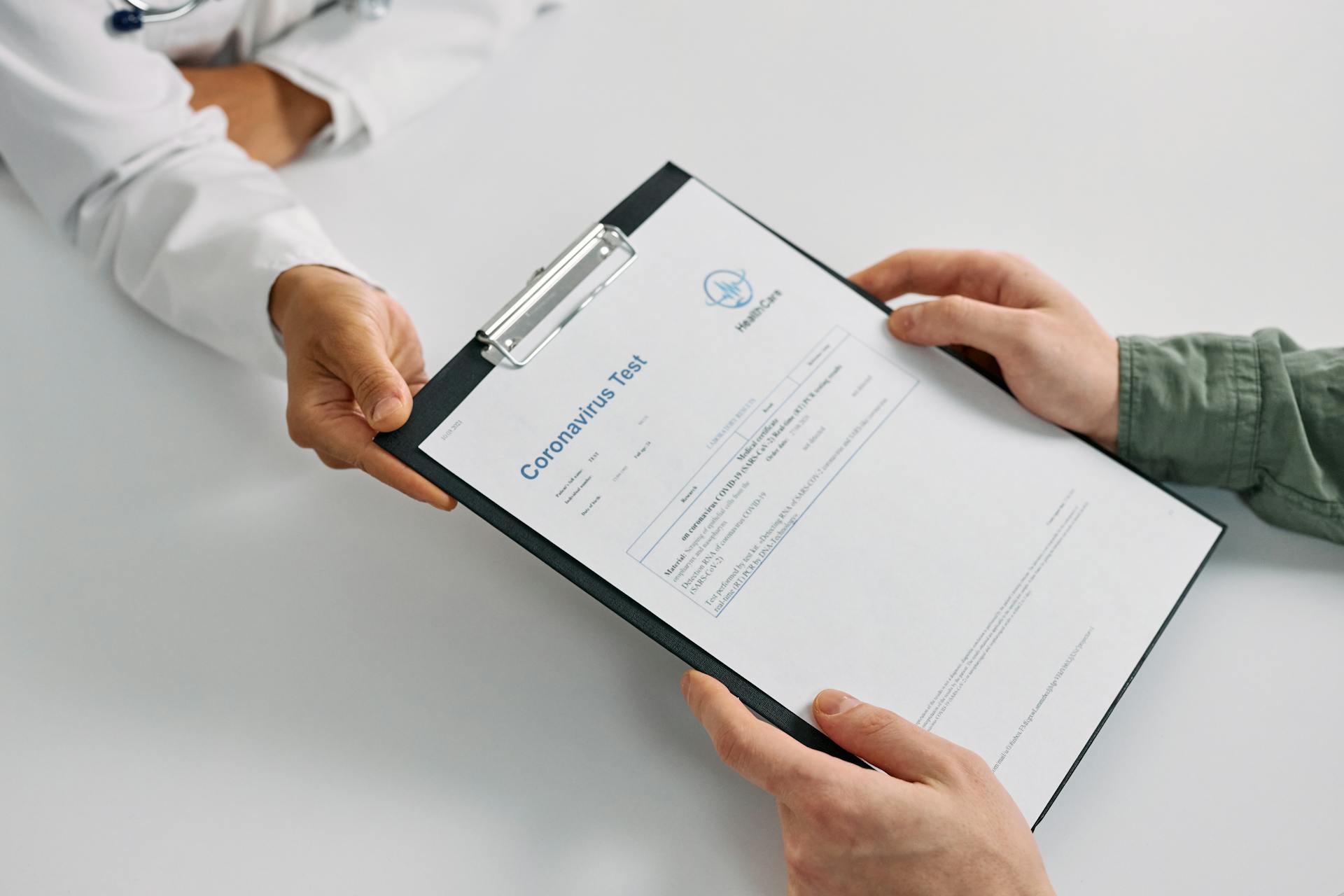
Health Savings Accounts (HSAs) are a great way to save for medical expenses, but it's essential to understand what expenses are eligible for reimbursement. Medical expenses can be a significant burden, and HSAs can help alleviate some of that financial stress.
To qualify for an HSA, you must have a High-Deductible Health Plan (HDHP) with a minimum deductible of $1,400 for individuals and $2,800 for families.
Health Savings Accounts can be used to pay for a wide range of medical expenses, including prescriptions, doctor visits, and hospital stays.
Some common eligible expenses include over-the-counter (OTC) medications, which can be purchased with HSA funds without a prescription, and medical devices, such as crutches or wheelchairs.
A unique perspective: Gold Ira Eligible
Eligible Expenses
HSAs cover a wide range of medical expenses, including prescription drugs, eyeglasses, eye exams, and dental expenses. You can use your HSA funds to pay for out-of-pocket expenses like co-payments for medical care and bills not covered by insurance.
On a similar theme: Consumer Health and Savings Accounts - Transit

Some common medical expenses that are eligible for reimbursement include acupuncture, artificial teeth, bandages, and birth control and contraceptive devices. You can also use your HSA funds to pay for chiropractor services, COBRA coverage, and communication equipment for the deaf or speech impaired.
Here are some specific examples of HSA eligible expenses:
- Acupuncture
- Artificial teeth
- Bandages
- Birth control and contraceptive devices
- Chiropractor
- COBRA coverage
- Communication equipment for the deaf or speech impaired
You can also use your HSA funds to pay for over-the-counter medications, including medicines for cold and flu symptoms, nasal spray, pain relievers, and stomach medication. Additionally, you can use your HSA funds to purchase a humidifier, as it is used to relieve an immediate medical issue.
Some other expenses that are eligible for reimbursement include crutches, dental treatments, diagnostic devices, and disabled dependent expenses for medical care. You can also use your HSA funds to pay for eye exams, eye surgery, fertility treatments, and guide dog or other service animals.
Here are some more specific examples of HSA eligible expenses:
- Crutches (purchased or rented)
- Dental treatments (most)
- Diagnostic devices (blood sugar monitors, blood pressure monitors, etc.)
- Disabled dependent expenses for medical care
- Eye exams
- Eye surgery
- Fertility treatments
- Guide dog or other service animals
You can use your HSA funds to pay for long-term care premiums, including Medicare B and D premiums. You can also use your HSA funds to pay for nursing home and services, organ transplants, oxygen and oxygen equipment, and physical examination, Annual.
A different take: Average Employee Health Insurance Cost per Month in Usa
Health Savings Account Basics
A health savings account (HSA) is a special savings account where money can be contributed on a pre-tax basis to pay for medical services and other qualifying out-of-pocket expenses.
HSAs can be opened by an individual or offered by an employer alongside an HSA-qualified high-deductible health plan (HDHP), and the individual employee always owns it.
Contributions to an HSA can come from both the employer and the employee, as long as the combined contributions don't exceed the annual contribution limit set by the IRS.
Contributions remain in the HSA indefinitely until they're used, and there's no penalty if the money isn't used - it just rolls over yearly.
For your interest: How to Deposit Money into Discover Savings Account
Savings Account Basics
A health savings account, or HSA, is a special savings account where money can be contributed on a pre-tax basis to pay for medical services and other qualifying out-of-pocket expenses.
HSAs can be opened by an individual or offered by an employer alongside an HSA-qualified high-deductible health plan (HDHP). The individual employee always owns the HSA.
A fresh viewpoint: Bcbs Hsa Eligible Expenses

Both the employer and the employee can contribute to the HSA, but the combined employee and employer contributions can't exceed the annual contribution limit, which is updated annually by the IRS in Publication 969.
Employee contributions remain in the HSA indefinitely until they're used, and there's no vesting schedule or penalty if the money isn't used, and the money rolls over yearly.
Employees aged 65 and older are free to use their HSA for anything without penalty.
Cares Act Provisions
The Cares Act brought some significant changes to Health Savings Accounts.
Under the Cares Act, passed in March 2020, HSA funds can also be used to pay for over-the-counter medicines and vitamins, provided they are recommended by a physician for a specific medical condition.
This includes medicines for cold and flu symptoms, nasal spray, pain relievers, and stomach medication.
Account holders can use HSA funds to purchase a humidifier, as it is used to relieve an immediate medical issue.
Explore further: Information about Hipaa
Benefits and Alternatives

If you're unsure if a health savings account is right for your organization, you have the option of implementing a health reimbursement arrangement (HRA).
An HRA is an arrangement between an employer and an employee, allowing employees to get reimbursed, tax-free, for their eligible medical expenses.
Employees who opt into a group health plan can take advantage of the HRA, which can offer unlimited monthly allowances for eligible expenses.
Employers can offer unlimited monthly allowances for eligible employees based on seven employee classes to pay for eligible expenses not fully paid for in their group health insurance plan, such as deductibles, coinsurance, and other items.
Integrated HRAs and HSAs are both good ways for employers to supplement a group health insurance plan.
Additional reading: What Banks Offer Health Savings Accounts
Exploring Their Benefits
Health savings accounts (HSAs) can be a great way to save for medical expenses, with contributions made on a pre-tax basis, allowing you to use the money for qualified out-of-pocket expenses.

The annual contribution limit for HSAs is updated annually by the IRS, and both employee and employer contributions can be made up to this limit.
HSAs offer a 100% federal income tax deduction on annual contributions, and withdrawals can be made tax-free to pay for qualified out-of-pocket medical expenses.
You can use your HSA debit card to easily pay for qualified health expenses, and the money in your HSA can be part of your long-term retirement plan.
HSAs are owned by the individual employee, and there's no vesting schedule or penalty if the money isn't used – it simply rolls over yearly.
Employees aged 65 and older can use their HSA for anything without penalty, not just out-of-pocket medical expenses.
If you're not sure if an HSA is right for your organization, you can consider a health reimbursement arrangement (HRA), which allows employees to get reimbursed, tax-free, for their eligible medical expenses.
An integrated HRA, also known as a group coverage HRA (GCHRA), is a good option for businesses of all sizes that offer a group health insurance plan.
For another approach, see: Can I Use My Flex Spending Account for Gym Membership
HRA vs FSA
An HRA (Health Reimbursement Arrangement) is a great way for employers to offer medical expense reimbursement to their employees, but it has some key differences from an FSA (Flexible Spending Account). An HRA is an arrangement between an employer and an employee, allowing employees to get reimbursed for their eligible medical expenses.
Unlike an HSA (Health Savings Account), an HRA is not a portable account that employees own and keep with them after they leave the organization. An HRA is only available to employees who opt into the group health plan, and employers can offer unlimited monthly allowances for eligible employees based on seven employee classes.
One of the main benefits of an HRA is that it can be used in conjunction with a group health insurance plan, allowing employees to get reimbursed for expenses not fully paid for in their plan. This can include deductibles, coinsurance, and other items.
A fresh viewpoint: What Size Companies Are Eligible for Health Reimbursement Accounts

An HRA is also a good option for employers who want to supplement their group health insurance plan, but it's not the only option. Employers can also offer a limited-purpose HRA that only reimburses employees for expenses that are exempt from the HSA deductible requirement.
Here are some examples of expenses that can be reimbursed through a limited-purpose HRA:
- Health insurance premium
- Long-term care insurance premium
- Dental expenses
- Vision care expenses
It's worth noting that a standard HRA will make an employee ineligible for an HSA, so employers need to be careful when setting up their HRA program to ensure compliance with regulations.
Featured Images: pexels.com


